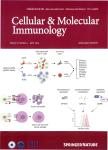CUL4B negatively regulates Toll-like receptor-triggered proinflammatory responses by repressing Pten transcription
作者机构:Key Laboratory of Experimental TeratologyMinistry of EducationInstitute of Molecular Medicine and GeneticsSchool of Basic Medical SciencesShandong UniversityJinanShandongChina Key Laboratory of Experimental TeratologyMinistry of EducationDepartment of ImmunologySchool of Basic Medical ScienceShandong UniversityJinanShandongChina State Key Laboratory of Radiation Medicine and ProtectionInstitutes for Translational MedicineSoochow UniversitySuzhouJiangsuChina
出 版 物:《Cellular & Molecular Immunology》 (中国免疫学杂志(英文版))
年 卷 期:2021年第18卷第2期
页 面:339-349页
核心收录:
学科分类:0710[理学-生物学] 1004[医学-公共卫生与预防医学(可授医学、理学学位)] 1002[医学-临床医学] 1001[医学-基础医学(可授医学、理学学位)] 100102[医学-免疫学] 10[医学]
基 金:We thank Prof.Chengjiang Gao and Prof.Wei Zhao for their critically reading of the paper.This work was supported by the National Natural Science Foundation of China(81571523 and 31872810) the Natural Science Foundation of Shandong Province(ZR2016HZ01) the Key Research and Development Program of Shandong Province(2016ZDJS07A08 and 2017GSF218027)
主 题:CUL4B TLR signaling Transcriptional repression
摘 要:Toll-like receptors (TLRs) play critical roles in innate immunity and inflammation. The molecular mechanisms by which TLR signaling is fine-tuned remain to be completely elucidated. Cullin 4B (CUL4B), which assembles the CUL4B-RING E3 ligase complex (CRL4B), has been shown to regulate diverse developmental and physiological processes by catalyzing monoubiquitination for histone modification or polyubiquitination for proteasomal degradation. Here, we identified the role of CUL4B as an intrinsic negative regulator of the TLR-triggered inflammatory response. Deletion of CUL4B in macrophages increased the production of proinflammatory cytokines and decreased anti-inflammatory cytokine IL-10 production in response to pathogens that activate TLR3, TLR4, or TLR2. Myeloid cell-specific Cul4b knockout mice were more susceptible to septic shock when challenged with lipopolysaccharide, polyinosinic-polycytidylic acid or Salmonella typhimurium infection. We further demonstrated that enhanced TLR-induced inflammatory responses in the absence of CUL4B were mediated by increased GSK3β activity. Suppression of GSK3β activity efficiently blocked the TLR-triggered increase in proinflammatory cytokine production and attenuated TLR-triggered death in Cul4b mutant mice. Mechanistically, CUL4B was found to negatively regulate TLR-triggered signaling by epigenetically repressing the transcription of Pten, thus maintaining the anti-inflammatory PI3K-AKT-GSK3β pathway. The upregulation of PTEN caused by CUL4B deletion led to uncontrolled GSK3β activity and excessive inflammatory immune responses. Thus, our findings indicate that CUL4B functions to restrict TLR-triggered inflammatory responses through regulating the AKT-GSK3β pathway.



